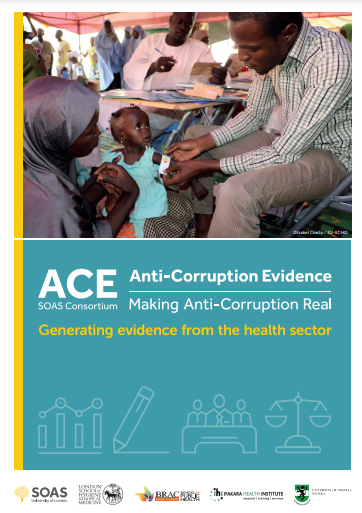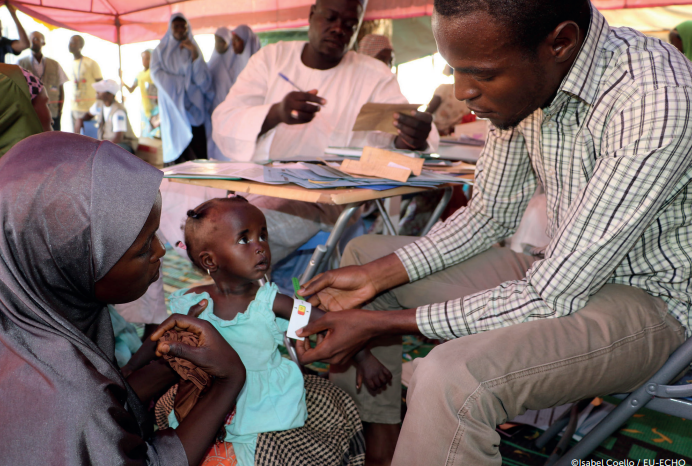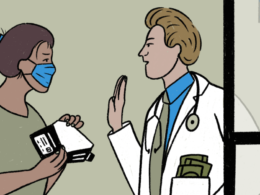Health Transformation Institute (HTI)
Joaquim Cardoso MSc*
Chief Researcher and Editor
November 7, 2022
*MSc from London Business School — MIT Sloan Programme
Overview:
- Delivering quality healthcare is a global challenge.
- Too many people around the world face barriers to obtaining high quality care because of corrupt practices.
- Yet there is very little detailed, high quality, evidence on how corruption in the health sector works:
* What circumstances allow or facilitate corruption?
* What incentive structures promote it?
* And what strategies can be adopted to challenge it?
Corruption in Health Care — ACE (Anti Corruption Evidence)
Delivering quality public healthcare is a global challenge.
ACE is concerned with the barriers health workers often face to provide the care patients need, whilst also prioritising their own gains due to badly designed incentive structures in health systems.
These structures often create individual uses of public resources for private gain.
- Some obvious examples include diverting patients to private facilities owned by a health worker, charging informal fees, and theft of medicines and equipment.
- More subtle examples include recommending unnecessary treatment for the health worker’s remuneration or workers simply not turning up for work, whilst still being paid.
The health sector is extremely vulnerable to corruption because of how its systems are established.
- Many private transactions take place between health professionals and patients, where amounts of information flow not only between patients and health workers but between workers and employers.
- A lack of accountability allows corrupt practices to flourish, leading to a provision of care that is at best ineffective and at worst harmful to the economic wellbeing of patients, their families and the system.
The consequences of corruption are extremely serious and include lost productivity, job loss and wasteful expenditure.
- They can extend beyond patients and health workers, to employees and customers in cases of insolvency.
- Corruption is also a major contributor to impoverishment, because it tends to widen inequalities and impact most on the poor and vulnerable.
Understanding the motivations behind corruption is essential if effective policies and interventions are to be designed.
- Different interventions including health facility committees, facility score-cards, and public hearings can be also used to achieve public accountability and thus reduce the space for corrupt harmful behaviours in the health sector.
- ACE is exploring these main lines of research in the health sector across our three countries and multiple levels of governance in health.
Corruption is also a major contributor to impoverishment, because it tends to widen inequalities and impact most on the poor and vulnerable.
ORIGINAL PUBLICATION (full version)

Anti-Corruption Evidence
Making Anti-Corruption Real: Generating evidence from the health sector
ACE — Anti Corruption Evidence
SOAS Consortium
Downloaded on November 2022
Why corruption matters in health
Some types of corruption in health care are obvious:
charging informal fees, diverting patients from public to private clinics, or theft of medicines or equipment.
Some are more subtle: recommending unnecessary treatment to increase the health worker’s income, or simply not turning up for work.
Corruption in healthcare does not only damage patients and their families. It also hurts public finances. And it is extremely hard to eliminate.
Many of the interactions between health care providers and patients are in private and a lack of effective accountability mechanisms allows corrupt practices to flourish.
Corruption in healthcare impacts most on the poor and vulnerable, widening existing inequalities.
Our programme of research, looking for ways to tackle corruption in health systems, is one of the first of its kind:
it will provide the evidence needed to understand the drivers of corrupt practices and find solutions that really work.

Our research
The Anti-Corruption Evidence research consortium is a multi-country research programme funded by UK Aid, working with partners in Bangladesh, Nigeria and Tanzania.
The Anti-Corruption Evidence research consortium is a multi-country research programme funded by UK Aid, working with partners in Bangladesh, Nigeria and Tanzania.
The health component of the consortium’s work asks:
- how do some of the pressures health workers are under when trying to provide the care their patients need lead to corrupt practices?
- How can we ensure transparent accountability of health providers to the communities they serve?
Researchers from SOAS University of London and from the London School of Hygiene & Tropical Medicine are working with partners at the BRAC James P. Grant School of Public Health (Bangladesh), the Ifakara Health Institute in Tanzania, and the Health Policy Research Group at the University of Nigeria, on two major crosscountry comparative studies.

Provider practice, motivation and health system performance
Healthcare workers participate in corrupt practices for different reasons in different places.
We want to understand these differences, and why they occur.
We also want to discover which forms of corruption are considered most politically acceptable and feasible to address, evaluating measures that help to enforce rules that prevent the worst excesses in each health system.
Ultimately, we want to develop a package of measures that is relevant to each country that we can be confident will improve provider practices.
Promoting affordable health care access
We already know that access to affordable medicines in Tanzania, Nigeria and Bangladesh is poor.
One of many reasons is the corruption at all levels of the supply chain.
Each country has tried hard to improve supply chains, strengthen procurement systems, and ensure equitable distribution of medicines.
If these approaches work, they should reduce the scope for corrupt behaviours.
Yet we know that the evidence that these do actually work is often weak, while a lack of accountability allows corrupt practices to flourish.
The result is that much care that is at best ineffective and at worst harmful.
Consequently, we are studying how we can help to strengthen existing anticorruption initiatives in Bangladesh, Nigeria and Tanzania.
We already know that access to affordable medicines in Tanzania, Nigeria and Bangladesh is poor. One of many reasons is the corruption at all levels of the supply chain.
What makes this research unique?
It is very rare to look at the range of different corrupt practices seen in health care as a whole and to ask how measures developed in other sectors might be used.
The SOAS ACE approach does not expect sudden transformations.
Instead it is a pragmatic approach that looks for strategies that an be implemented incrementally.
The research identifies the reasons behind specific rule-violations that result in poor health outcomes, and to investigate whether feasible changes in incentives, especially at local levels, can result in better outcomes because healthcare staff who deliver services will want to behave differently.
The SOAS ACE model brings a unique approach to identifying feasible anti-corruption.
It is based on four strategies. The first two are particularly relevant to these health projects:
- Aligning Incentives: how can incentive structures be altered so that some players begin to support rule-enforcement in productive ways?
- Designing for Differences: do different types of health practices violate rules and engage in corruption for different reasons, and how can feasible policy changes encourage better rule-following behaviour overall?
- Building Coalitions
- Resolving Rights
For more on the four ACE strategies, and how we intend to test them through our research projects, visit www.ace.soas.ac.uk/strategies.

Research methodologies
We are conducting global research studies, in collaboration with local partners. Our partners have a wealth of expertise and contextual understanding that we will draw on, within an agreed research framework. We make use of the following methods:
Systematic literature review: We still know far too little about corruption in the healthcare system. By reviewing the existing evidence systematically, we will, for the first time, draw together evidence on all the major types of corruption, the institutional, organizational and political causes of corruption, and those strategies (both successful and unsuccessful) that have been used to combat corruption in the health sectors in Bangladesh, Nigeria and Tanzania.
Policy review: Drawing on the political settlements framework, we will analyse policy choices, examining key legal and policy documents, regulatory frameworks, and formal processes that enable or fail to tackle corrupt practices. We will supplement this analysis of documents with interviews with key national level policy-makers, exploring how poor policy-making acts as an incentive for corrupt, rule-breaking practice among health workers.
Political settlements framework The political settlements framework looks at the distribution of power across political and economic organisations in a society, and how this balance evolves over time, in order to understand what types of policies emerge and how effectively policies are implemented — or subverted. It looks at the distribution of power between different groups and within the ruling party. Understanding the political settlement can help determine which strategies to reduce corruption are likely to be politically acceptable to those in power. Find out more: ace.soac.ac.uk/working-papers
Building consensus: Once we have identified types of corruption occurring among different healthcare providers, and those interventions that could prove effective, we will facilitate workshops using Nominal Group Technique methods to identify the five practices among frontline healthcare workers which are most detrimental, and where we can identify actions that are both politically acceptable and technically feasible. These workshops will draw on expertise from national, regional and district policy-makers, as well as representatives of provider networks.
In-depth interviews: Our understanding of corruption and health worker behavior will be rounded off by qualitative interviews with a range of health workers in each country, drawing on the political settlements framework to understand how corruption occurs, the ways in which health workers act as a group, and as individuals. This part of the research will focus closely on the formal and informal networks in which health workers are embedded, allowing us to understand how different relationships drive rule-breaking or rule-enforcing behaviour.
Health worker survey: A major part of the research will be a survey of approximately 400 health workers per country, enabling us to understand how widespread the practices identified in the qualitative research are.
Discrete Choice Experiment: Using Discrete Choice Experiments, we will examine the decision-making of different health workers and ask how complex incentives and trade-offs affect their decisions. Discrete Choice Experiments have been widely used to indicate actual intentions and is methodologically suited to sensitive research areas. The method will help us explore how possible anti-corruption strategies identified through the course of the research could work in practice.
The research began in late 2017 and first publications will be published from Spring 2018 onwards.
Who is involved in SOAS ACE Health sector research?
The Anti-Corruption Evidence research consortium led by SOAS University of London is a partnership of highly experienced research and policy institutes based in Bangladesh, Nigeria, Tanzania, the UK and the USA. The SOAS ACE health partners are:
- London School of Hygiene & Tropical Medicine (LSHTM)
- The Centre of Excellence for Universal Health Coverage (CoE-UHC), BRAC James P. Grant School of Public Health (JPGSPH), Dhaka
- Ifakara Health Institute (IHI), Dar es Salaam
- The Health Policy Research Group (HPRG) of the College of Medicine, University of Nigeria Nsukka (UNN)
Originally published at: https://ace.soas.ac.uk/health/










